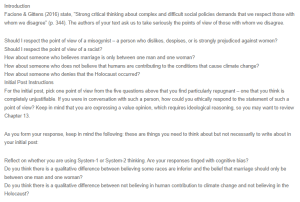Discussion – When the People You Love Don’t Think Like You
My choice of point of view for this assignment is whether I should respect the perspective of a racist person. While Facione & Gittens (2016) put emphasis on the significance of respecting different perspectives in order to build strong critical thinking, respecting does not mean accepting ideologies that are harmful. A racist’s point of view is profoundly at odds with the principles of equality, dignity, and respect for all human beings. Supposing I found myself in a conversation with a racist, despite finding their perspective repugnant and entirely unjustifiable, there are a few strategies of ideological reasoning I can apply to ethically respond to a statement from their point of view. The first is fact-based argumentation, whereby I would present to them undisputable proof from victims of racism. In addition, I would also provide accurate information to counter prejudiced views and highlight scientific data that confirms the genetic similarities across races and the social constructs that define race. Secondly, I would try to understand the motivation behind their perspective and their beliefs. This would help me understand whether their beliefs are based on personal experiences, misinformation, or cognitive biases, just to name a few causes. By getting a better understanding of this motivation, I would be able to respond effectively.
Another strategy I would apply is critical engagement, whereby I would challenge their core values, including human dignity and equality, by pointing out how their perspective on race goes against that. Further, I would challenge their selective perception because they would have reasons why they hold their views, which then leads to confirmation bias, whose function, as stated by Peters (2022), is to support their perspectives. In addition, I would also highlight the ethical consequences of racism and explain how such views have led to the loss of millions of lives for centuries now. Lastly, I would try to highlight to them the various ethical and moral problems brought about by racism, including discrimination, violence, and social injustice.
References
Facione. P., & Gittens, C. A. (2015). Think Critically. Pearson
Peters, U. (2022). What is the function of confirmation bias?. Erkenntnis, 87(3), 1351-1376.
ORDER A PLAGIARISM-FREE PAPER HERE
We’ll write everything from scratch
Question
Introduction
Facione & Gittens (2016) state, “Strong critical thinking about complex and difficult social policies demands that we respect those with whom we disagree” (p. 344). The authors of your text ask us to take seriously the points of view of those with whom we disagree.

When the People You Love Don’t Think Like You
Should I respect the point of view of a misogynist – a person who dislikes, despises, or is strongly prejudiced against women?
Should I respect the point of view of a racist?
How about someone who believes marriage is only between one man and one woman?
How about someone who does not believe that humans are contributing to the conditions that cause climate change?
How about someone who denies that the Holocaust occurred?
Initial Post Instructions
For the initial post, pick one point of view from the five questions above that you find particularly repugnant – one that you think is completely unjustifiable. If you were in conversation with such a person, how could you ethically respond to the statement of such a point of view? Keep in mind that you are expressing a value opinion, which requires ideological reasoning, so you may want to review Chapter 13.
As you form your response, keep in mind the following: these are things you need to think about but not necessarily to write about in your initial post:
Reflect on whether you are using System-1 or System-2 thinking. Are your responses tinged with cognitive bias?
Do you think there is a qualitative difference between believing some races are inferior and the belief that marriage should only be between one man and one woman?
Do you think there is a qualitative difference between not believing in human contribution to climate change and not believing in the Holocaust?

